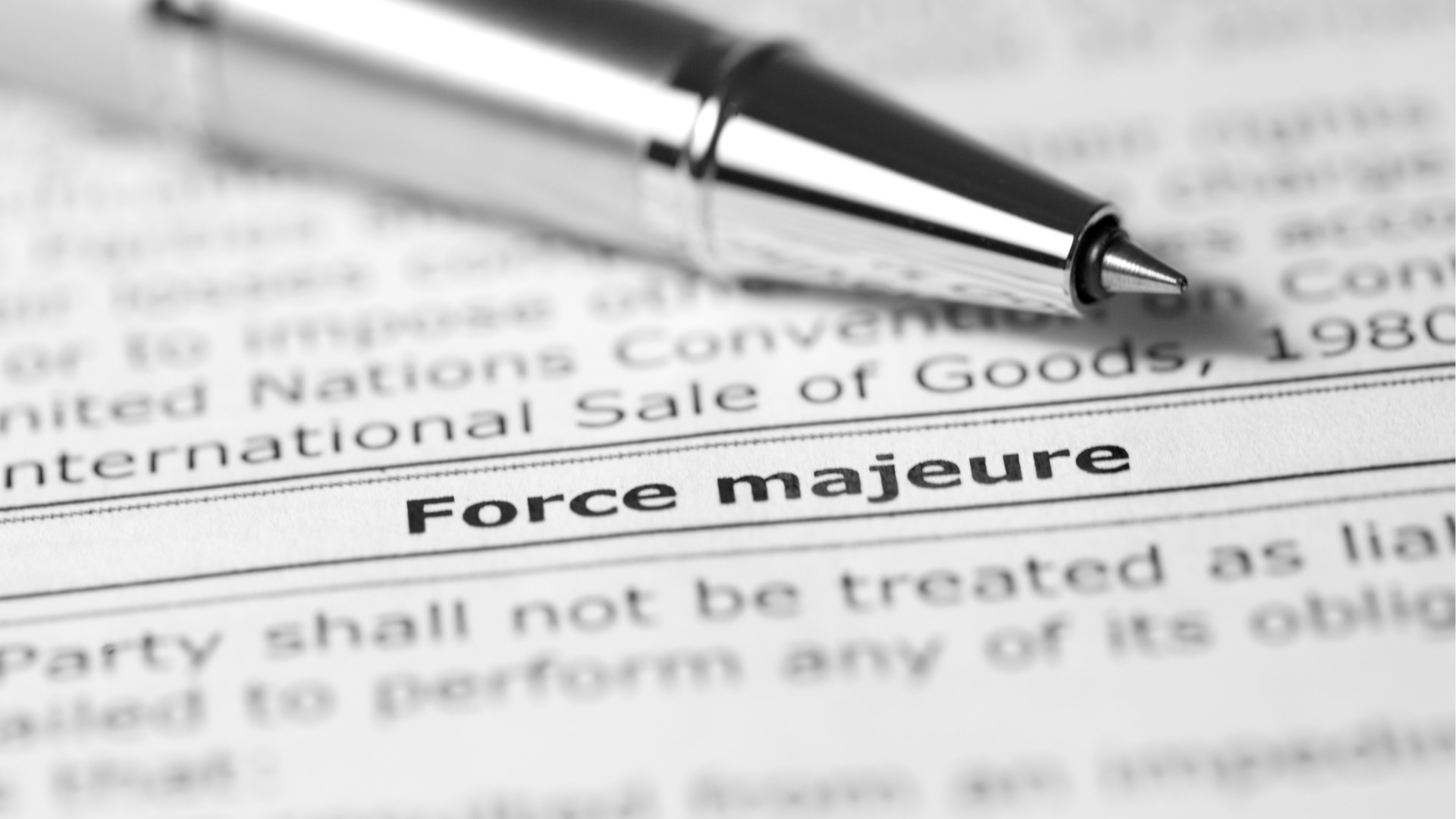Force Majeure clauses have gained significant attention in recent times, particularly in the wake of global disruptions such as the COVID-19 pandemic. These clauses have become crucial tools for parties seeking protection when events beyond their control impact contractual performance.
In Australia, as in many jurisdictions, the interpretation and enforcement of Force Majeure clauses can significantly influence contractual outcomes. This article explores the intricacies of Force Majeure clauses in Australia, offering insights into their importance and what to look for.
What is a Force Majeure clause?
Force Majeure, a French term translating to “superior force,” typically refers to unforeseen events or circumstances that prevent a party from fulfilling its contractual obligations. These events are typically beyond the control of the contracting parties and are often characterised by their unpredictability and inevitability.
For example, Force Majeure may be invoked where a supplier fails to deliver building materials to a worksite by a deadline because of widespread and unseasonal flooding. The effect of a Force Majeure clause is to excuse the supplier from the failure to the extent it was caused by the unseasonal event.
The Force Majeure concept does not exist in the Australian legal system except were agreed contractually. In other words, to be excused from a failure to perform contractual obligation on the basis of a Force Majeure event, the contract must include specific provisions to this effect.
The effect of the Force Majeure clause will depend on interpretation of the contract. Furthermore, it is important to understand ‘Force Majeure’ is simply a concept, and that any given contract may use a different expression.
Force Majeure in the Context of the COVID-19 Pandemic
The global COVID-19 pandemic underscored the importance of well-drafted Force Majeure clauses. In Australia, as elsewhere, parties faced unprecedented challenges in meeting contractual obligations due to government-imposed lockdowns, travel restrictions, and disruptions to supply chains.
Contracts that explicitly included pandemics, epidemics, or government actions related to public health as Force Majeure events were better positioned to navigate the uncertainties of the pandemic. In contrast, contracts with vague or generic Force Majeure provisions faced increased scrutiny.
Force Majeure versus Frustration
Frustration is a similar legal concept recognised in the Australian common law. Frustration occurs when an unforeseen event radically changes the nature of contractual obligations, making performance impossible, illegal, or commercially absurd. In such cases, the contract may be considered frustrated, relieving the parties from further performance.
A significant difference is that Frustration discharges the parties of further obligations under the contract, whereas Force Majeure may provide a temporarily relief and is much more flexible.
Frustration is a narrow doctrine and may not cover all situations where Force Majeure may apply. Therefore, the inclusion of a well-drafted Force Majeure clause in a contract provides parties with a more comprehensive and tailored framework for addressing unforeseen events.
Drafting Force Majeure Clauses
- When drafting a Force Majeure clause, specificity is key. Clearly define the events that will trigger the clause, such as natural disasters, acts of terrorism, or pandemics. Generic language like “acts of God” may be too broad and subject to interpretation.
- While specific events should be listed, it is advisable to include a non-exhaustive list to cover unforeseen circumstances. This allows for flexibility, ensuring that events not explicitly mentioned but meeting the defined criteria can still be considered Force Majeure.
- Ensure that the Force Majeure event directly causes the inability to perform contractual obligations. There should be a clear nexus between the event and the party’s non-performance. This connection is vital to prevent parties from using Force Majeure as a pretext for avoiding contractual duties unrelated to the triggering event.
- Establish clear notice requirements for invoking the Force Majeure clause. Timely communication is essential to allow parties to assess the situation and plan accordingly. Failure to provide prompt notice may impact the invoking party’s ability to claim relief.
- Specify the obligations of the parties to mitigate the impact of the Force Majeure event. This may include implementing alternative measures, seeking reasonable substitutes, or making efforts to resume performance as soon as practicable. Courts often look favourably upon parties that actively work to minimise the effects of the Force Majeure event.
- Clearly outline the duration for which the Force Majeure clause will be in effect and the rights of termination or suspension during this period. Providing a mechanism for periodic reviews ensures that the parties can reassess the situation as it evolves.
- Given the potential impact of government actions on contractual performance, expressly include governmental actions, changes in law, or regulations as triggering events. This is particularly relevant in situations like public health emergencies where government interventions can be significant.
Force Majeure clauses play a pivotal role in allocating risk in contractual relationships. If you are entering into any contract, you should consider whether a properly drafted clause is included. We remain ready and able to assist with these matters at NB Commercial Law.
Give NB Commercial Law a call, we offer an complimentary consultation and are happy to help.
Please email us via [email protected] or call +61 (07) 3876 5111 to book a consultation.
If you got value out of this article please follow us on LinkedIn.
About the Author
Daniel Dash has over ten (10) years of experience in commercial and corporate law and is a Director of Commercial Law team at No Borders Law Group. His areas of focus include contractual disputes, commercial transactions, finance, corporate advisory services and trusts.
His practice areas also include business structuring, shareholder contracts, corporate law, commercial litigation, commercial property, intellectual property, taxation and business succession planning.
Daniel works with company directors and business owners to achieve results that align with client objectives. In all matters, he endeavours to provide practical recommendations and develop clear and effective strategies.
Daniel Bio Page
[email protected]


